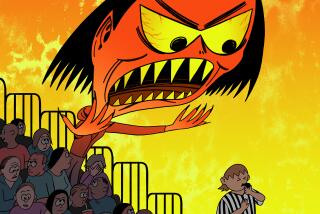Out of the Mouths of Babes : Are today’s kids just plain rude--or simply very frank?
- Share via
Imagine this: You’re shopping at a toy store with your 9-year-old when he spots one of those pricey high-tech squirt guns big enough for Arnold Schwarzenegger to brandish.
In a loud, demanding voice, he orders you to buy it for him--”Right now!”
Calmly, you say “no,” and quietly remind him that you’re shopping for a birthday present for his friend, not for him. But his pleading and whining get louder until he manages to attract the attention of everyone within a 500-foot radius.
Then he delivers his most lethal shot: “I hate you!”
Consider this: You’re expecting an important telephone call from your boss. The phone rings and your teen-age son reaches it before you do. “Who is it?” he grunts. When your boss asks for you, your disappointed teen-ager mutters something and drops the phone on the table.
And lastly, your 6-year-old daughter goes to a new friend’s house to play. She orders her friend’s mother around, demanding snacks and toys without so much as a “please” or “thank you.” When the woman finally takes her aside and chastises her, your astonished daughter says, “You’re the mommy? I thought you were just the baby-sitter.”
Talk to parents today, and these are the kinds of “rude kid” stories you’ll hear. Think how often you’ve heard yourself or others complain that children today seem to be more demanding or disrespectful toward others.
Child development experts, educators and parents generally agree that children today do behave differently than previous generations. But there’s considerable disagreement over whether their behavior is rude and insensitive or simply more frank and open.
Some argue it’s a tougher world today, and kids are simply mimicking the behavior of adults. Others contend parents are too busy with careers and other daily pressures to spend time teaching their children how to be courteous.
Or is it that kids in the ‘90s just feel more free to express themselves?
Judy Fenton, president of the Beverly Hills Unified School District’s PTA Council, believes children are “more frank . . . more direct.”
“I think generations before misconstrued that to be rude,” says Fenton, who has four children, ages 11 to 25. “The old expression ‘Children should be seen and not heard’ is of the past. Children are more vocal today. Parents encourage dialogue with their children. And when you start to have that dialogue with your child, you have to expect almost anything.
“It’s the ‘90s, and it’s very different,” Fenton says. She suggests parents need to “try to live up to the times and not expect our children to behave like they would have behaved in the ‘70s or ‘80s.”
“It is a lot tougher to raise kids today,” observes T. Berry Brazelton, a noted pediatrician and author of several child development books. “We are raising kids in a very turbulent society that doesn’t really pay attention to children.
“And when kids don’t have respect for others, it usually comes from parents who don’t have enough respect for their own kids or enough time for them or enough energy for them to have created a decent self-image.”
Growing concern among educators and parents over how to help children improve self-esteem, academic achievement and interaction has led some schools in Los Angeles and Orange counties to institute programs such as Project Self-Esteem, a program taught by volunteers that teaches children how to build self-confidence.
“It’s part of building good citizenship for all of us,” says Carol Stiff, principal of Serrano Elementary School in Orange. “If kids don’t feel good about each other or about themselves, it’s hard for them to be independent and think on their own.
“We see many emotional and social problems in the world today. If we had good manners and were kind and courteous to one another, the world would be a better place.”
Stiff stressed that children do better socially and academically when parents are there for them. “Parents should spend more time with their children and turn the television off. It’s not always easy to do because people have to work and be gone from their kids for long periods of time.”
So you’ve sat down with Little Johnny and Little Jane and taught them to be kind, say thank you and not kick dogs. But they still tell the baby-sitter to go to . . .
What’s a parent to do?
There is no one answer. Experts agree that it depends on the child’s age, the child’s temperament at the time of the incident (is is nap time? is the child hungry?), the context of the incident and the child’s rearing.
Nancy Nimmo of Laguna Niguel says she was so concerned about raising her children to be courteous and well-mannered, she enrolled them in a manners class offered through Saddleback College in Mission Viejo.
“I believe in the importance of manners because it’s just a form of diplomacy,” says Nimmo. “And what more does this world need than people who can be diplomatic? It’s more than just teaching children which fork is proper to use.
“Children want to learn how to behave properly. They don’t want to embarrass themselves. I want my girls to learn how to treat people with dignity and politeness.”
The course, taught by Cheryl Moore, teaches everything from basic pleasantries like how to introduce people and proper table etiquette to writing thank-you cards. The final class session is a tea at the Ritz-Carlton in Laguna Niguel. Classes are always full and there is generally a waiting list, Moore said.
Nimmo’s daughters, Meggie, 9, and her sister, Cate, 7, say they try to choose friends who have good manners and treat others with respect.
“We like people who are nice,” says Meggie, who attends Crown Valley Elementary School in Laguna Niguel with her sister. “If we didn’t have manners, this world would really be mixed up.”






